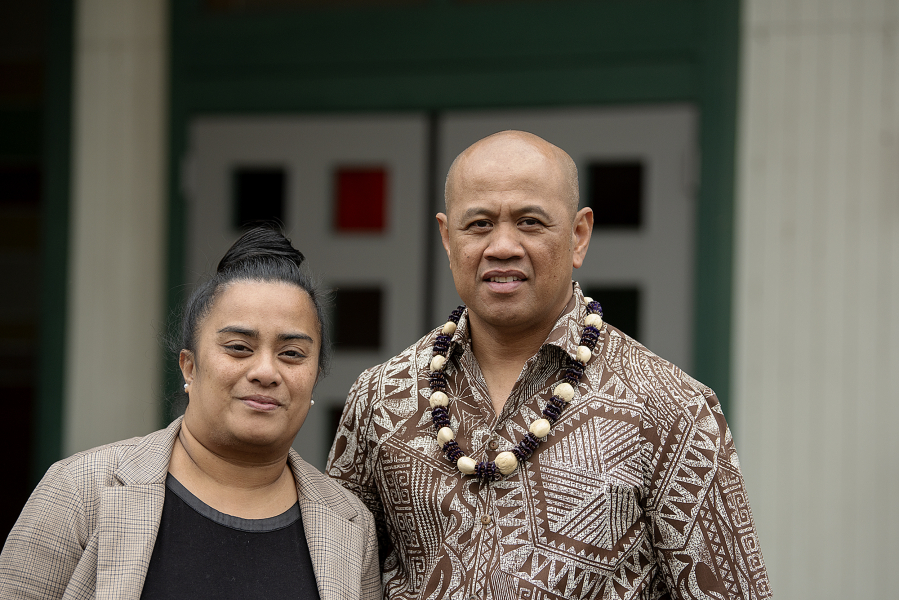In Carol Jack’s home state of Chuuk in the western Pacific Ocean, community is central to islander culture. Family members across generations take care of one another and often live together in houses they own, Jack said.
The concept of paying rent to a landlord — or potentially becoming homeless if you don’t — doesn’t exist in Chuuk, said Jack, a community health worker at the nonprofit organization Share.
As a result, finding a home in Clark County can be a culture shock for Chuukese immigrants.
“Back home, we don’t pay rent. Everything is free,” Jack said. “You own your land, you own your house, you own everything.” Even food is mainly free, she added, as people farm, pick fruits from trees and fish in the ocean.
An increase in Chuukese immigrants to Clark County over the past 10 years have put these cultural differences into sharp focus for local service providers like Share.
Nearly half of the 56 residents at the Share Homestead family shelter identify as Native Hawaiian/Pacific Islander, a broad ethnic category that Share Community Relations Director Jessica Lightheart said is mostly Chuukese people.
To help bridge the cultural divides, Share has hired seven Chuukese employees, starting with Jack in 2020. Council for the Homeless is also working with Chuukese advocates to better connect with the community.
Cultural barriers
Chuuk is one of four states making up the Federated States of Micronesia. In 1986, Micronesia and the United States entered into a resolution allowing Micronesian citizens to live, study and work in the U.S. in exchange for America’s exclusive access to Micronesian land and waterways.
Jack moved to Portland as a teenager in the late 1990s for educational opportunities. Other Chuukese immigrants come in search of better health care or jobs to support family members back home. Over time, a growing Chuukese community has formed in Clark County as newcomers join relatives who are already here.
“When a member of a family moves to one place, it seems like all the family follows,” said Jack’s husband, Anderson, a Chuukese man who moved to Portland in 1987. “It’s like a stepping stone.”
Though the Census does not count Chuukese people specifically, Anderson estimates Vancouver’s population to be in the thousands. Many of these immigrants face cultural barriers that make it difficult to find housing and jobs.
Juanita Yasu, a Chuukese woman who works with Council for the Homeless as a liaison, translator and advocate, thinks language is the largest challenge for Chuukese people. Yasu and Jack both learned English while growing up in Chuuk, but many recent immigrants do not speak it.
Chuukese is largely a verbal language, meaning some who speak it don’t write it, according to Lightheart.
“How do you put a rental application into Chuukese?” Lightheart said. “Even if you could get somebody to translate it, could the person seeking housing be able to read it?”
Moreover, because the concept of renting is foreign to many Chuukese people, direct translations are often not enough. Chuukese clients may need native speakers like Yasu and Jack to explain what renting means.
Yasu has found that Chuukese immigrants often assume they can stay with family when they arrive in Clark County. But if too many family members move into an apartment without adding their names to the lease, it can cause problems.
“We can’t have a lot of families living in an apartment like we used to at home,” Yasu said. “If we have multiple families living here together, it’s too many people in the house. And sometimes, they get evicted.”
This is how some families end up sleeping in cars or on the streets, Jack said.
Lightheart thinks these types of cultural disconnects demonstrate a need for landlords and housing providers to reevaluate how they serve certain communities.
“Whether it’s fully systemic racism, whether it’s just poor rental housing practices, you’re not recognizing that this is how a community is used to living and taking care of themselves,” she said. “And the system won’t change to accommodate it.”
A learning process
Navigating these barriers is a learning process for service providers, said Council for the Homeless Deputy Director Sunny Wonder. “Reaching out and recognizing that we’re not the experts is really important,” she said.
In the council’s efforts to connect with the population, Yasu led a community forum in the Chuukese language last summer to get residents’ feedback for the upcoming Clark County Homeless Action Plan.
“The reason why we suggested a meeting in Chuukese is because a lot of what would have been discussed would have been lost in translation,” Yasu said. “For many of our community members, they’re not used to talking about their experiences or what they need. They’re not used to offices, agencies reaching out to hear their voices.”
Going forward, Share and Council for the Homeless continue adapting to the needs of the diverse communities they serve.
“Thinking about for service providers, those of us who are American and specifically me as a white person, the additional work that needs to be done,” Wonder said. “It is truly centered around listening and giving the space, and making sure that we take that in and act on it.”




